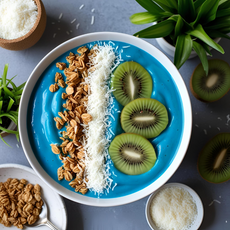Raising healthy eaters isn't about restriction or force-feeding broccoli. It's about nurturing a love for good food, mindful movement, and creating positive associations with healthy choices. Here are some tips to help you plant the seeds of healthy habits in your kids while keeping you honest and committed to your own wellness practices.
Make it a Family Affair:
- Involve them in the kitchen: Let your little ones help with age-appropriate tasks like washing fruits and veggies, preparing snacks, stirring ingredients, or building their own easy recipes that don’t require knives, heat, or complicated cooking methods. Some of our favorite kid-friendly recipes include preparing sandwiches, topping toast or bagels with their choice of spread, building yogurt and smoothie bowls with fresh fruits, whole grain granola and cereal, and healthy ‘sprinkles’ like chia seeds, sunflower seeds, hemp hearts, or cinnamon. This fosters a sense of ownership and makes them more excited to try the finished product.
- Grocery shopping adventures: Turn grocery shopping into a treasure hunt. Challenge them to find colorful fruits and vegetables or explore the healthy cereal aisle for options like Safe + Fair granola, oatmeal, or cereal with no added sugar and simple recognizable ingredients. Additionally, let them play apart in meal planning, allowing them to suggest good-for-you options that the whole family can enjoy together.
- Mealtime is family time: Gather around the table for meals whenever possible. This creates a sense of routine and connection, making healthy eating a social and enjoyable experience.
- Get active together: Schedule family walks, bike rides, or even dance parties in the living room. Make physical activity a fun way to bond and spend quality time together
Focus on Fun, Not Force:
- Get creative with presentation: Cut sandwiches into fun shapes, arrange fruit kebabs, or layer yogurt, granola, and berries in a colorful parfait. Food that looks appealing is more enticing for little ones.
- Make healthy swaps: Instead of sugary snacks, offer kid-friendly alternatives like homemade granola bars, banana slices, and a sprinkle of dark chocolate chips. Other easy swaps include swapping in protein-rich, plant-based pasta alternatives, powerballs made with oats and wholesome ingredients instead of cookies, ‘nice cream’ in place of traditional ice cream, and wholegrain or gluten free bread versus standard white bread.
- Get creative with presentation: Cut sandwiches into fun shapes, make fruit kebabs, or arrange yogurt parfaits with colorful toppings. An appealing presentation can spark curiosity and encourage them to try new things.
- Celebrate small victories: Acknowledge and praise their efforts, not just the outcome. Did they try a bite of a new veggie? Great job! Positive reinforcement goes a long way.
Actions Speak Louder than Words:
- Lead by Example: Children often mimic the behaviors they observe in adults. Therefore, one of the most powerful ways to encourage healthy habits is by embodying them ourselves. Whether it's choosing nutritious snacks, staying active, or practicing mindfulness, demonstrating these behaviors sets a strong example for kids to follow.
- Ditch the diet talk: Avoid labeling foods as "good" or "bad." Instead, focus on the benefits of healthy choices. Talk about how fruits and vegetables give you energy to play, or how whole grains keep you feeling full.
- Practice Mindful Eating: Teach children the importance of mindful eating by encouraging them to pay attention to their hunger and fullness cues. Encourage them to savor each bite, focusing on the taste, texture, and aroma of their food. By fostering mindfulness around eating, children develop a healthier relationship with food and are less likely to overeat.


